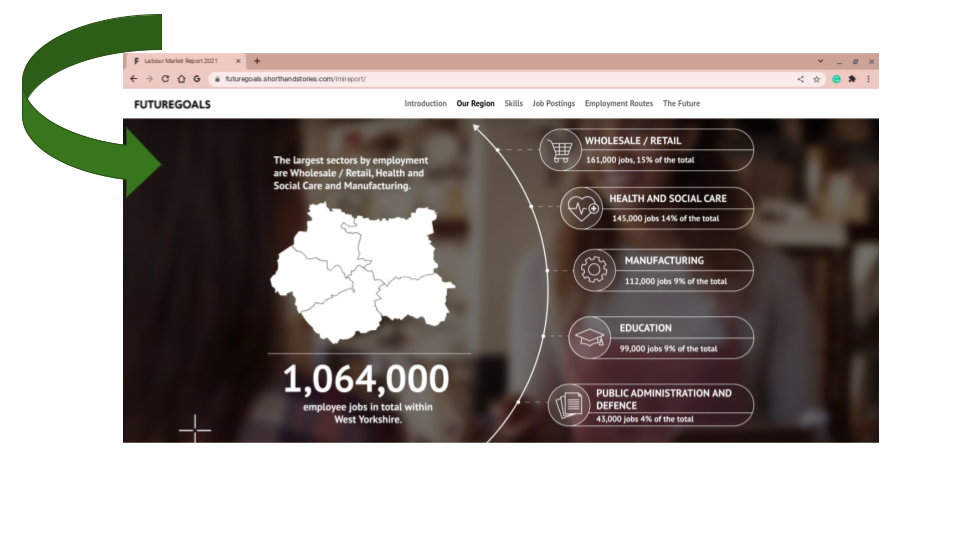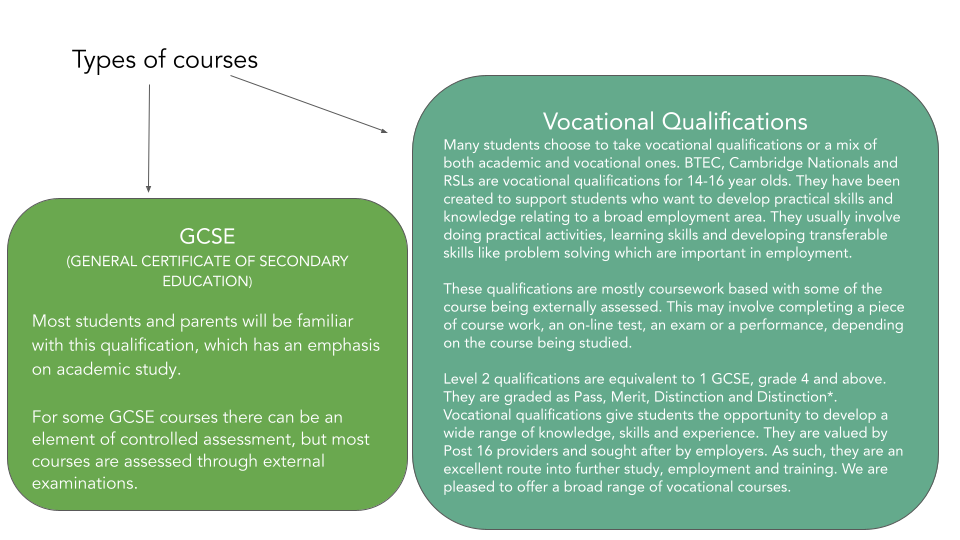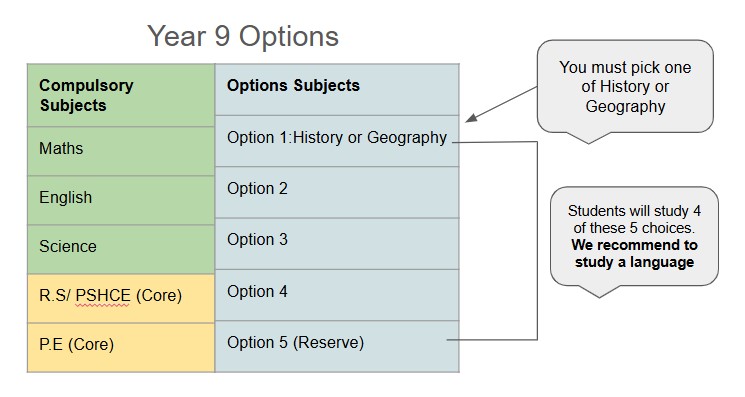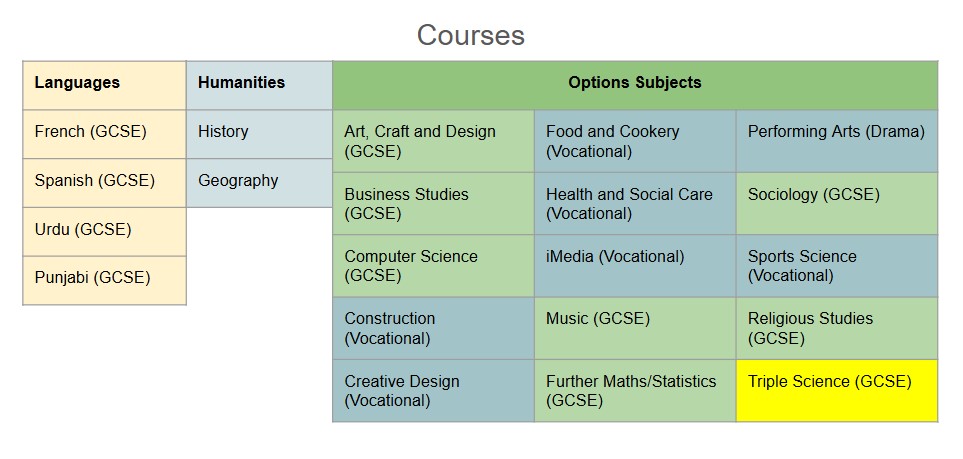Year 9 Options
This guide is designed to help parents and pupils prepare for the programme of study at Key Stage 4, in Year 10 and Year 11.
During Key Stage 3 at Priesthorpe, pupils follow a broad curriculum, which includes compulsory subjects from the National Curriculum.
At Key Stage 4, pupils are asked to make choices to select the subjects they would like to study. This doesn’t mean a totally free selection, however, but a guided choice with pupils, parents and teachers working together to decide on the most appropriate combination of subjects.
We believe that for most of our students, our core offer, combined with a language and a humanities subject (Geography or History), will ensure they can continue to make a broad subject choice at Post 16. We have broadened our languages offer to now include Urdu and Punjabi GCSE.
It is important that when making this choice, students think about their personal interest, ability and aptitude for a particular subject, but also that the subjects chosen fit the student’s needs.
Information about the Key Stage 4 curriculum at Priesthorpe is included in this guide. Parents and pupils are encouraged to discuss their options with teachers. Any queries about the content of this guide can be directed to relevant subject staff; Key Stage 4 leader, Mr Button or Mrs Pratt our Principal.
I look forward to your son or daughter progressing to the next stage of their schooling with enthusiasm and resilience.
Louise Pratt,
Principal
Help your child to feel prepared for the future:
Choosing GCSE options is an exciting step in your child’s career journey. Here are some handy tips so you can support them to choose the subjects that are right for their future career options, skills and interests.
As a parent or carer, you’re likely to be one of the biggest influences on your child’s future study and career plans. Young people today will enter into a complex and competitive job market, that’s exciting and rapidly evolving. To help you have conversations about the future, follow the links below.
What will the future job market be like?
Labour Market Information is information about the current economic and employment situation. Use this online guide to explore the most in-demand skills and current job trends in West Yorkshire.

Choosing options at Priesthorpe:
All students will follow a programme of study, which will include:
- Maths
- English
- Science
- Physical Education
- Religious Studies
- PSHCE
Details of all these courses, as well as the optional courses, are included below.

As well as the compulsory courses, students will study 4 optional courses. Students should choose 5 options and will meet with a senior member of staff to select the 4 most suitable courses for them.


Find out more about the compulsory subjects studied in Key Stage 4:
English Language and English Literature GCSE
This two year course leads to a GCSE in both English Language and English Literature. The course will enable students to:
- read a wide range of texts, fluently and with good understanding;
- develop skills of analysis and empathy;
- develop a love of literature while reading exciting, engaging and challenging texts;
- read critically, and use knowledge gained from wide reading to inform and improve their own writing.
- write effectively and coherently using Standard English;
- use grammar correctly, punctuate and spell accurately;
- acquire and apply a wide vocabulary;
- gain understanding of grammatical terminology for reading, writing and spoken language.
The GCSE is a linear course and students will sit their exams in the summer of Year 11. They will receive detailed feedback throughout the course in the form of extended reading and writing assessments. During the two years students will build on skills and knowledge learnt lower down the curriculum, but will read and analyse increasingly sophisticated fiction and non-fiction texts.
Mathematics GCSE
The aims and objectives of our Mathematics GCSE programme are to enable students to:
- develop fluent knowledge, skills and understanding of mathematical methods
- and concepts
- acquire, select and apply mathematical techniques to solve problems
- reason mathematically, make deductions and inferences, and draw conclusions
- comprehend, interpret and communicate mathematical information in a variety of forms appropriate to the information and context.
The course looks at the main areas of mathematics, namely:
Number; Algebra; Ratio, Proportion and Rates of Change; Geometry and Measures; Probability; Statistics.
The exam consists of three equally-weighted papers at either Foundation tier (grades 1 to 5) or Higher tier (grades 4 to 9), each 1 hour and 30 minutes long. There is one calculator paper and two non -calculator. These are sat at the end of year 11.
Students must have their own scientific calculator. We recommend Casio Fx83GT – PLUS.
Revision guides, workbooks and calculators are available from the maths office.
Pupils can use JUSTMATHS to revise www.justmaths.co.uk . Username PriestStudent Password Priest.
Support videos are available on www.corbettmaths.co.uk
Extra questions can be found on DrFrostmaths.com
Science GCSE
The Science GCSE programme aims to:
- develop scientific knowledge and conceptual understanding through the specific disciplines of biology, chemistry and physics
- develop understanding of the nature, processes and methods of science, through different types of scientific enquiries that help them to answer scientific questions about the world around them
- develop and learn to apply observational, practical, modelling, enquiry and problem-solving skills, both in the laboratory and in other learning environments
- develop their ability to evaluate claims based on science through critical analysis of methodology, evidence and conclusions, both qualitatively and quantitatively
All students in Years 9, 10 and 11 study science which is taught in nine lessons per fortnight.
All pupils will be taught Biology, Chemistry and Physics with a view to enter students for either Combined Science: Trilogy (2 GCSE’s) or triple science. This will be dependent on progress in Year 10 so all students are given the opportunities to gain 3 GCSEs in Science.
Examinations will take place at the end of Year 11 with ongoing required practical set out by AQA exam specification to be assessed within exams.
Physical Education (Core)
Physical Education in Key Stage 4 aims to build upon the activities, skills and principles developed in KS3, whilst at the same time broadening opportunities in a range of new contexts. The programme will comprise of a range of activities from different areas including Games, Health and Fitness, Dance and Gymnastics, Athletics and Striking and Fielding activities.
To further develop some activity areas at KS4 an emphasis is placed on pupils’ ability to lead and officiate rather than just perform.
Within some blocks of work it may be possible for pupils to opt for particular activities that could be tailored to the group’s strengths and preferences.
Key Stage 4 activities may include:
| Trampoline | Football | Badminton | Aerobics |
| Dance | Basketball | Tennis | Fitness |
| Volleyball | Athletics | Rounder/Softball/Cricket | Gymnastics |
| Handball | Hockey | Dodgeball |